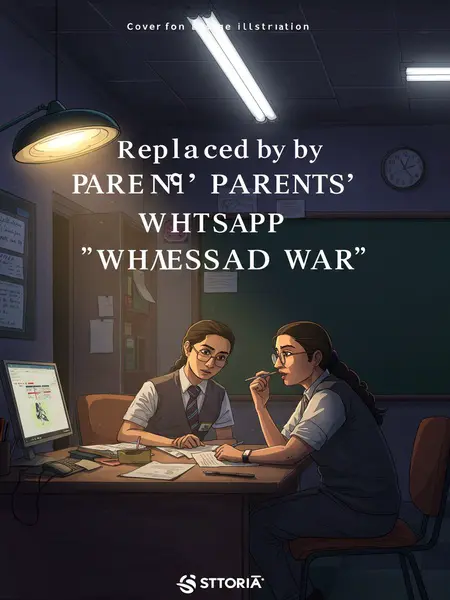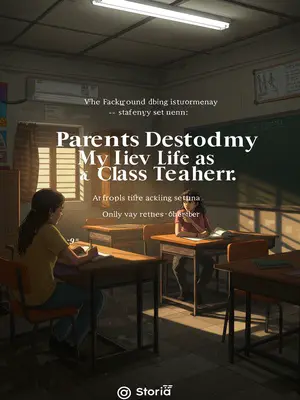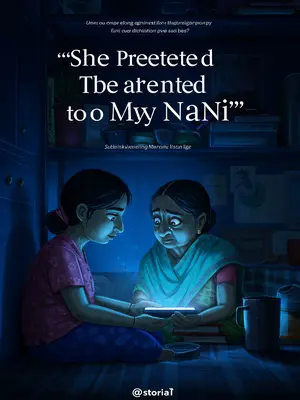Chapter 3: The Cost of Change
At seven the next morning, I reached the door of Class 12C on time.
The corridor buzzed with students—some munching aloo parathas wrapped in old newspapers, others yawning, water bottles clanging against metal railings. The air was thick with chalk dust, ink, the faint tang of last night’s rain, and the sharp note of phenyl from the peon’s morning cleaning.
Most kids are day scholars. Some come by bus, some cycle in with wet hair from a hurried bucket bath. Many share tiffin under the neem tree before the bell—comparing whose mother packed the best paratha.
They’d probably heard something at home last night.
I imagined dinner tables echoing with my name, between bites of dal chawal or dosa. Did any of them feel a twinge of guilt hearing their parents complain?
In class, where they usually recited or wrote vocabulary during self-study, nearly everyone now sat with heads down.
No usual chatter, no notes passed, just a heavy, collective silence. Even the monitor, usually eager to greet me, kept his gaze on his shoes.
A few shuffled uncomfortably, pencil boxes clicking. The familiar scent of hair oil drifted up. I wondered if any of them knew how much I cared.
Of course, there were a few bold ones. When I appeared at the door, they gave smug grins.
There’s always a group in every batch who test boundaries. Their confidence is almost admirable—if only it wasn’t so misplaced.
News about letting them rest on Saturdays had reached parents thanks to these students.
One or two had run home, twisting my words, eager to impress their families with tales of my leniency. Their parents must have nodded along, eyes wide with self-righteous outrage.
Thinking of this, I stopped at the door, not entering as usual.
I took a deep breath, adjusted my dupatta, and let the moment linger. The click of my sandals was louder than usual.
My gaze swept over the students—the ones I’d poured my heart into, now suddenly so small, so fragile. Disappointment and affection mixed inside me. How quickly innocence can turn to ambition, or fear.
Standing outside, I knocked on the doorframe.
The sound echoed. A few students jumped. I waited for silence, then spoke as steadily as I could.
"I think everyone already knows—your parents want to give you a different learning environment."
For a second, all you could hear was the whir of the ceiling fan and the distant call of the samosa-wala outside. The words hung heavy, pressing down on every desk.
Students who’d kept their heads down suddenly looked up, panic flickering in their eyes. Some whispered, eyes darting, searching for an anchor.
Among the bold ones, Kabir—the ringleader—called out: "Arrey, Sir, don’t worry. As long as you’re more responsible in the future, we can try to persuade our parents not to—"
He spoke with bravado, but it didn’t reach his eyes. He expected to win, to be the hero.
Too lazy to let him finish, I met his gaze, smiled slightly: "I agree."
My words sliced through the tension. The class fell silent. Even Kabir’s friends stared at him, unsure whether to laugh or panic.
Kabir’s face flushed red. He looked like a chicken with its neck wrung. The class turned to stare.
"Wh—" He only managed half a word before silence.
The message was clear—his plan had backfired.
I felt a twinge of pity. This boy, so sure of his cleverness, had just learned his first real lesson in consequences.
He was the same student whose parent had boasted: "Mera beta to IIT Bombay ya DU ja sakta tha."
The irony wasn’t lost on me. Expectations can become chains, and Kabir felt their weight now.
If I hadn’t worked with him after school, step by step, never mind IIT or DU, he’d be lucky to reach a third-tier private college.
I remembered those extra hours, breaking down calculus, trying to break through his blocks. Sometimes, the truth is a bitter pill.
I met his eyes and said calmly:
"So I won’t be coming for morning self-study today. You can do as you wish."
My voice was gentle but final. Some students looked shocked; others bit their lips, suddenly unsure about what they’d started.
"Also, since the class teacher is about to be replaced, to avoid any awkwardness, I won’t be teaching your maths classes anymore either. That way, I can’t be accused of misleading students."
The news settled slowly, like monsoon creeping through an open window. Some looked relieved, others nervous, a few—regretful.













